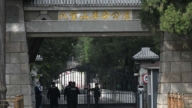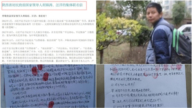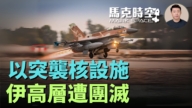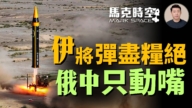【新唐人2015年01月28日讯】中共中央政治局日前通过“国家安全战略纲要”,强调党对国家安全的绝对领导。虽然中共官方媒体并没有透露内容,但引起各界关注。根据美国《纽约时报》报导,中央政治局警告,中国目前面临国内外极大危机。有评论认为,这是中共总书记习近平再次收权的动作。
中共中央政治局1月23号召开会议,审议通过“国家安全战略纲要”,强调党对国家安全的绝对领导。
根据中共官媒《新华社》的报导表示,这场会议是由中共中央总书记习近平主持,会议认为,当前改革进入攻坚期和深水区,社会矛盾多发叠加,并强调,当前各种可以预见和难以预见的安全风险挑战,前所未有。
根据美国《纽约时报》报导指出,中共中央政治局批准“国家安全战略纲要”,确定国家安全领域的优先解决事项,并警告中国大陆面临严峻的内部和外部危险,让习近平完成了将安全事务置于议事日程核心位置的最后一步。
美国中文杂志《中国事务》总编辑伍凡:“共产党内部反腐败打老虎,打了两年了,引起共产党内部激烈的斗争,习近平要把所有的权力集中在国家安全委员会,所以全国人大、国务院、政协、法院、最高法院、最高检察院,所有的权力集中到国家安全委员会,也就集中到国家安全委员会主席习近平手上。”
《纽约时报》认为,虽然强调危险迫在眉睫,是中共领导人一贯的政治语言,但习近平比他的前任们,更热衷把自己描绘成“国家利益的坚强捍卫者”。
这个会议还强调,必须坚持共产党对国家安全工作的绝对领导,坚持集中统一、高效权威的国家安全工作领导体制。
英国广播公司《BBC》报导说,习近平身兼国家主席、中央军委主席、国安委主席及深化改革领导小组组长多种职务,形成对权力的全面垄断。而这次会议再次强调,坚持集中统一、高效权威的国家安全工作领导体制,无疑是重申了习近平的绝对领导地位。
中国问题专家石实:“这个安全法本身就代表一个象征的意义,就是现在中国,其实就是中共处于内外的危机,它要发出的是这个信号,第二个,这个安全法出台之后,它后面还会有一系列的东西,根据国家安全法所做出的举动,那种行动,你比如说国家安全委员会,那么根据这个新的安全法,那个国安委它的职责可能会扩展。”
中国问题专家石实认为,按照之前反腐“抓老虎”的模式,国家安全法出台的大背景,有可能是为清洗江泽民那一派。
中国问题专家石实:“第一个,就是贪腐,比如这个人的贪腐在海外曝光;第二个,有可能是在国内他就开始慢慢引用,慢慢地放出一段口子,然后互相之间讨论;第三,他开始动他周边的人,把那些人全部抓起来,抓起来之后,然后看看那个舆论差不多了就公布,那前面无论是从徐才厚、周永康来看,他基本上都是这样。”
1月23号,中共政治局还罕见集体学习了“辩证唯物主义”。从此后各类解读来看,官方已经将这次“学习”定性为毛、邓两次思想领域斗争夺权后的第三次大举措,官媒自己都承认这往往是“大行动的开始”。
采访/朱智善 编辑/黄亿美
CCP Politiburo: China is Facing Huge Crisis
At Home And Abroad
The Chinese Communist Party (CCP) Politburo recently
passed the National Security Strategy Outline,
stressing the party’s absolute leadership
over national security.
Although the CCP’s official media did not disclose
the content, it has received attention from society.
According to U.S. The New York Times,
the CCP Central Politburo warned that China
is facing great crisis at home and abroad.
Some commentators believe that this is CCP General
Secretary Xi Jinping’s next move to tighten control.
The CCP Central Politburo meeting was held on Jan. 23.
It reviewed and passed the National Security Strategy
Outline, stressing the party’s absolute leadership
over national security.
According to CCP official media Xinhua News Agency,
the meeting was presided over by CCP General Secretary
Xi Jinping.
The conclusion of the meeting was that the current reform
has entered a crucial and challenging stage, with multiple
layers of social conflicts, and there are unprecedented
predictable and unpredictable risks and security challenges.
According to The New York Times, the National Security
Strategy Outline approved by the CCP Central Politburo
determines priorities of national security, and warned about
serious internal and external dangers China is facing.
It enables Xi Jinping to complete the last step
of placing security affairs as key issues.
U.S. Chinese magazine China Affairs editor Wu Fan:
“The CCP has carried out the anti-corruption movement
for over two years.
It has caused intense internal struggle.
Xi Jinping wants all the power consolidated
to the National Security Council, including the NPC,
the State Council, the CPPCC, the courts,
the Supreme Court and Supreme People’s Procuratorate.
All power is concentrated to the National Security Council,
which means to Xi Jinping."
The New York Times reported that while emphasizing
imminent danger has always been the CCP leadership’s
political language, Xi is more keen than his predecessors
to portray himself as “a strong defender of national interests".
The meeting also emphasized adherence
to the absolute leadership of the CCP over national security
and adherence to a centralized, efficient and authoritative
national security leadership system.
The BBC reported that Xi Jinping has formed
a comprehensive monopoly of power with titles
of President, Chairman of the Central Military Committee,
Chairman of National Security Committee
and Leader of Deepening the Reform Leadership Team.
This meeting again stressed to adhere to a centralized,
efficient and authoritative national security leadership system.
It undoubtedly reaffirmed Xi Jinping’s absolute leadership.
China Expert Shi Shi:
“This Security Act itself has a symbolic meaning.
It wants to send out a signal that
the CCP is facing crisis inside and outside.
A series of moves will follow the Security Act.
For instance, responsibilities of the National Security
Council might expand."
Shi Shi thinks according to previous anti-corruption model,
the introduction of the National Security Act
may be used to cleanse the Jiang Zemin faction.
Shi Shi: “First is corruption,
such overseas exposure of an individual’s corruption;
Then China might begin to quote and discuss the information;
Third, people around the individual will be arrested.
Once the public is ready,
the announcement will be made.
No matterwhether its Xu Caihou or Zhou Yongkang,
their cases basically were handled in such ways."
On Jan. 23, the CCP Central Political Bureau also
collectively studied “Dialectical Materialism."
The officials admitted this “study" is the third
major initiative following the two ideological struggles
to seize power conducted by Mao Zedong
and Deng Xiaoping.
Even official media admits this is often
the “Beginning of a Big Action."
Interview/Zhu Zhishan Edit/Huang Yimei



























